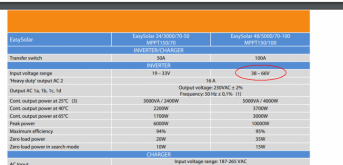Thingol
New Member
- Joined
- Dec 8, 2020
- Messages
- 49
Hello folks,
I intend to series-connect four or five 12V Lithium batteries to make a 48V or 60V bank for my residential solar project. From my reading here and here, I understand that keeping the four/five units in balance is critical. Note that each of these units already have an internal BMS, so unit-level balancing is taken care of. I found that one way to balance out a series bank is with a Victron battery balancer. However these are going for USD 65/- a piece or so and do not appear to have such great ratings . For a 48V bank (four 12V batteries), one would need 3 balancers. Should a balancer cost that much ?? I am looking for better alternatives in terms of price and compactness, preferably ones that come as a single unit for 48V banks (four 12V batteries) or for 60V banks (five 12V batteries). If anyone has dealt with this before, please share your experience and recommendations, many thanks.
I intend to series-connect four or five 12V Lithium batteries to make a 48V or 60V bank for my residential solar project. From my reading here and here, I understand that keeping the four/five units in balance is critical. Note that each of these units already have an internal BMS, so unit-level balancing is taken care of. I found that one way to balance out a series bank is with a Victron battery balancer. However these are going for USD 65/- a piece or so and do not appear to have such great ratings . For a 48V bank (four 12V batteries), one would need 3 balancers. Should a balancer cost that much ?? I am looking for better alternatives in terms of price and compactness, preferably ones that come as a single unit for 48V banks (four 12V batteries) or for 60V banks (five 12V batteries). If anyone has dealt with this before, please share your experience and recommendations, many thanks.
Last edited:




